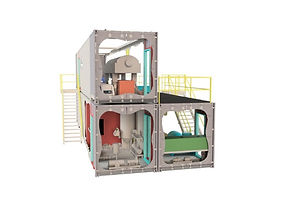
Water Clarification Technology
Water Clarification Process
The RJ Envirotech Water Clarification Process can be used as an inline water clarifier. The system uses our patented technology to aid in the separation of water and oil. Typical results are 80-90% reduction in hydrocarbon content in the water through the first pass.
Systems are built with the ability to scale up and down, as well can be used in series for better clarification. Our Systems can be used in many different processing areas to ensure clean water for re-use or disposal.
We build our processes for both atmospheric and pressurized systems. This allows the water treatment to be done without cooling and retaining the heat value already in the water.
During operations, the hydrocarbon streams are recovered as froth and returned to the process units. The water streams are also recovered and primarily sent for water re-use. Solids contained in the hydrocarbon sludge drop to the bottom of the process vessel where they are easily extracted and treated for disposal.
The RJO system is fully automated; relying on RJO programming and instrumentation to control and adjust the speed of the pumps throughout the system. The RJO system is the first one of its kind to automatically self-balance when receiving varying oil slugs and is not affected by surges at a battery or flow rate out of a free water knockout.
The RJO Phase Separator is a highly efficient and enhanced separation device that uses controlled gas induction to induce both dissolved and entrained gas. The process virtually eliminates the oil or bitumen in the slurry left behind with current oil frothing technology as the entire stream is subjected to treatment within the phase separator.
In the process, each of the three cells possesses the capacity to operate to the capacity of 80 to 95 percent removal rate of the oil originally present upon entering each cell.
Typically, we will start with tens of thousands of ppm of hydrocarbons in the slurry and it comes out at less than 50 ppm; typically into the 25 ppm range. As a result of the process, the water coming off of the RJO unit for reuse or re-injection will be essentially oil-free.
Oil Recovery Technologies
Slop Oil Processing
De-oiling is a critical requirement in today's operations with more focus on oil recovery and water reuse. With RJ Oil Technologies, we have effectively and efficiently cleaned all varieties of emulsions.
The evolution of modularized centrifuge processes has given industry the ability to manage their production waste at the site. Our ability to draw on decades of process operations experience with in-house manufacturing and engineering has allowed RJ Oil the ability to provide industry-leading designs in all their processes.
RJ Oil's mobile rental fleet has capacity from 5m3/hr to 75m3/hr. With systems that easily scale up and down, we can handle rates for any volume of flow.
RJ Oil can provide a variety of tricanters for site-specific processing while providing our customers with industry-leading operational support.
Flottweg Z6E Tricanter Package
Up to 25m³/hr. three phase processing

RJO-PRO-X Series
Up to 25m³/hr. processing rate

Features:
-
-
Class 1 zone 1 electrics, ASME b31/3 piping
-
Internal agitated feed tank
-
Auto solids loading - no loader required
-
Minimal footprint of 53’ x 16’x 20’H for ease of rig in
-
Reduced mobilization and transportation costs
-
Long-term solution with mobile capability
-


Solids Processing Technology
Dredging and dewatering, are crucial aspects of many industries. RJ oil has been able to perform these tasks in multiple areas of operations. We have been involved with municipal, pulp and paper, mining, oilfield dredging and dewatering projects. The storage, handling, and transport of solid materials are common operations throughout the oil and gas industry. In some sectors, the majority of the raw materials and products may be solids, solids processing can play a predominant role in many other industries as well. In the oil industry, however, some handling of solids is required; raw materials, byproducts or products themselves. Knowledge of solids handling principles and techniques are thus required throughout various industries including oil and gas. Typical subjects that feature in this area include; monitoring solids flow and level, blending and separation, feeding and conveying, characterizing particle size and shape, and handling of materials including safety and environmental considerations.
At RJ Oil we pride ourselves on being able to handle the full scope involved with these projects. We can provide the dredges, fluid processing, and the transportation for these projects. We have performed these services on both live and shut in ponds.
